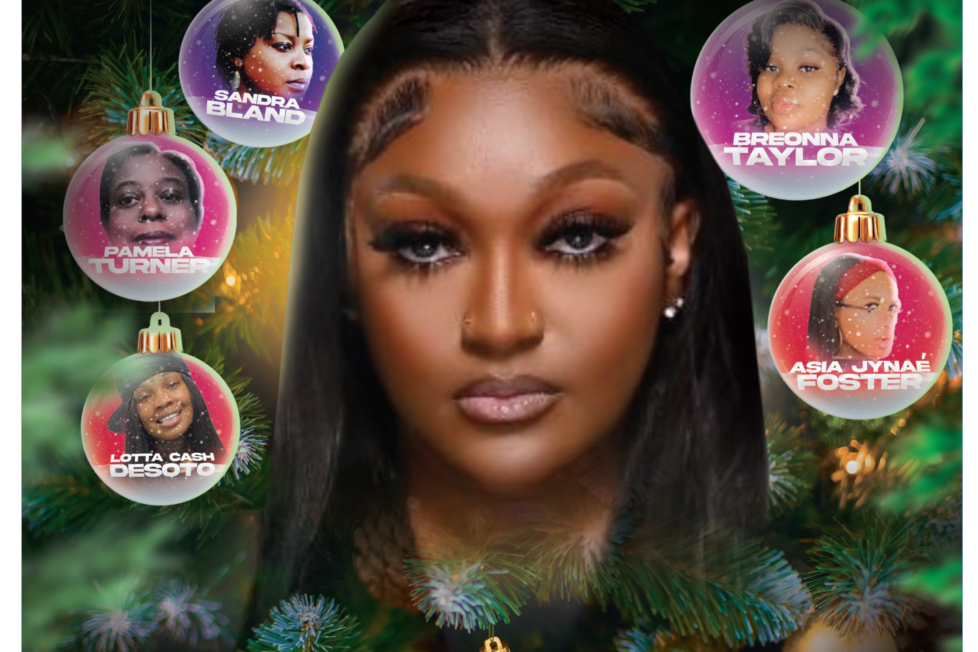All I want for Christmas is to LIVE: Femicide – stop killing our Black women!


Headlines. Social media hashtags. Cries for justice. When will it end when it comes to violent assaults against Black women?
“The most disrespected person in America is the Black woman. The most unprotected person in America is the Black woman. The most neglected person in America is the Black woman,” Malcom X poignantly said. And judging from the daily news updates, it appears to be an all-out assault against us.
The controversial police-related deaths of Sandra Bland and Breonna Taylor had people across America screaming for social justice. Pamela Turner, a Black woman who suffered from mental illness, was shot and killed by a Baytown police officer at the apartment complex where she lived. Her heartbroken family cried tears outside the courtroom when a jury found the officer not guilty.
It is clear, violence against Black women is a growing epidemic.
Now, in wake of the tragic case of Shanquella Robinson, many have been introduced to a new word – femicide – which is defined as the intentional killing of a woman based on her gender.
Like most American women, Black women and girls are often killed by someone they know. A study by The Guardian noted that nearly a third of Black women and girls in 2020 were known to be killed by an intimate partner or a family member, according to law enforcement homicide data reported to the FBI, and another 16% were killed by a friend, neighbor or acquaintance.
Related: Who will be held accountable? Shanquella Robinson laid to rest as more videos surface online
That may be true in Robinson’s case. The 25-year-old went on a trip to Mexico with her friends and came home to America in a body bag. Her friends told her parents that she died from alcohol poisoning, but that was found to be untrue.
Cellphone video which surfaced shortly after her death shows her being violently assaulted by one of her friends during the trip. The heartbreaking footage showed the friend pummeling Robinson across the head and neck while the defenseless woman was naked. While the identity of the person responsible has not yet been confirmed, an autopsy noted the cause of death was from “a direct attack, not an accident,” and involved a female friend of the victim. Mexican prosecutors are working with the United States to extradite the person wanted in the killing.
Statistics show crimes against Black women are definitely on the rise, especially involving gun violence.
Even in hip hop, female entertainers are falling victim. Recently, Memphis rapper Destinee “Lotta Cash Desoto” Govan was gunned down in Houston streets.
[SCROLL BREAK!!! Bayou Beat News can also be found in PRINT at a store near you. Click the link below to check out our E-Edition!]
The Guardian also noted that five Black women and girls were killed every day in the United States in 2020, as a national increase in violence during the pandemic took a heavy toll on some of the country’s most vulnerable people.
In all 1,821 Black women and girls were killed that year. That was an additional 461 women and girls who were murdered in 2020 compared with 2019 – more than one additional killing a day.
Further statistics show Black women and girls in the US are four times more likely to die by violence than white or Hispanic women.
Even though American men make up the majority of homicide victims, both Black and Indigenous women and girls face a homicide risk that is higher than that of white men and boys (4.7 homicides per 100,000 people).
In Kentucky, where Taylor’s killing by white police officers in Louisville sparked national protests, homicides of Black women and girls statewide tripled in 2020, from 10 women and girls killed to 33, compared with the year before.
In Washington DC, the nation’s capital, homicides of Black women more than doubled, from 10 to 25. No women of any other race were murdered in the district that year, according to the police department.
In 2020, half the 46 recorded homicides of trans and gender non-confirming people nationwide were killings of Black trans women, according to the Human Rights Campaign (HRC), which tracks these deaths. That number is rising, with at least 34 Black trans women were killed in 2021 and even more in 2022.
In Houston, Asia Jynaé Foster, a 22-year-old Black transgender woman, was shot and killed on November 20, 2020. A man, identified as Jermal Richards, has been charged in her case.
Foster’s death occurred on Transgender Day of Remembrance, a day which honors those in that community who were lost to fatal violence.
There is a stark difference in numbers when it comes to violence against Black women from all walks of life.
A study by the Institute for Women’s Policy Research noted that more than four in 10 Black women experience physical violence from an intimate partner during their lifetimes, and 20% of black women are raped during their lifetimes – that’s more than any other ethnic group combined. Black women also struggle with psychological abuse at significantly higher rates when compared to their white counterparts.
Because of their roles as breadwinners and caretakers, Black women who are killed leave deep voids across entire communities.
“When you kill a Black woman, often times you kill a cornerstone of the community, because there are a lot of people tied to her,” Cheryl Neely, a Michigan-based sociologist, said during an interview.
Sadly, that is correct, so how can you kill your backbone, and still expect to stand?
–
